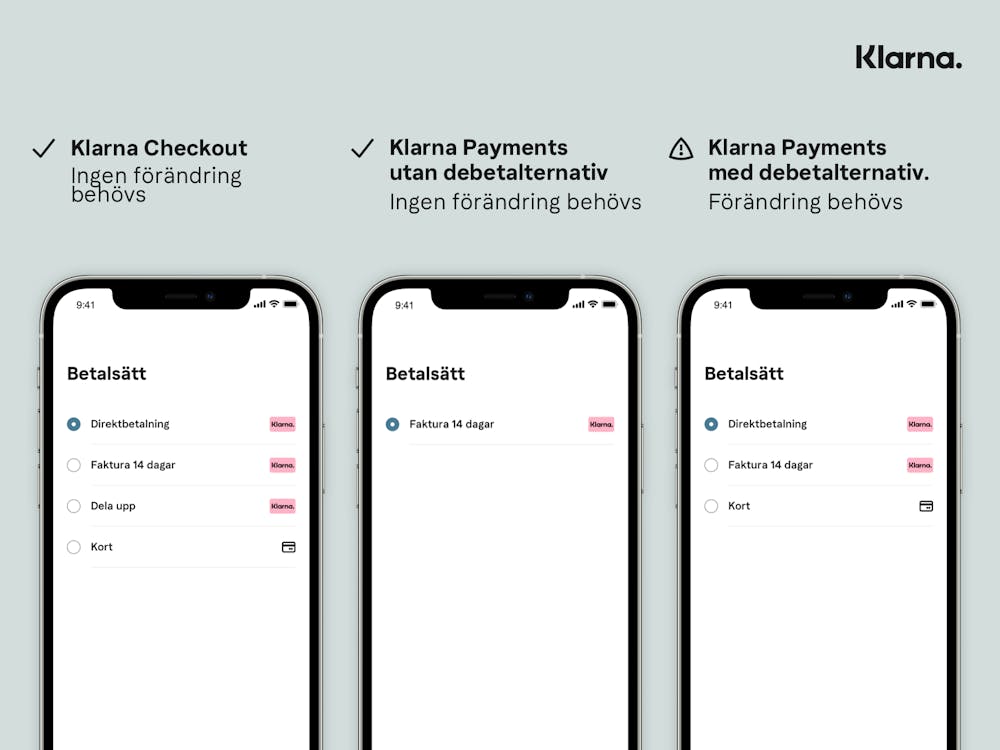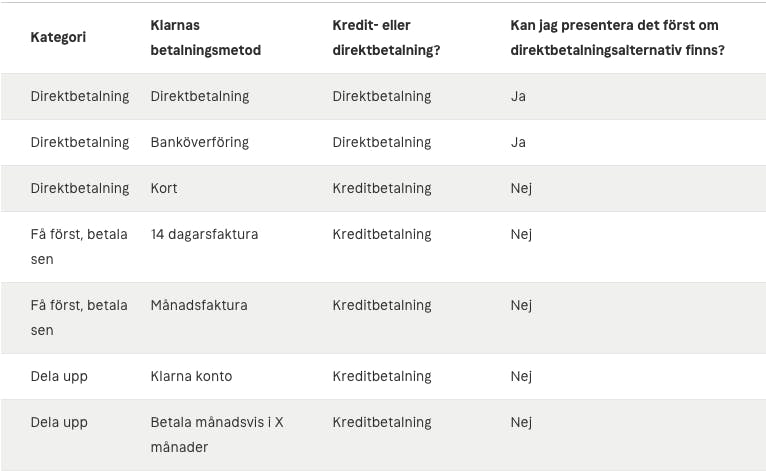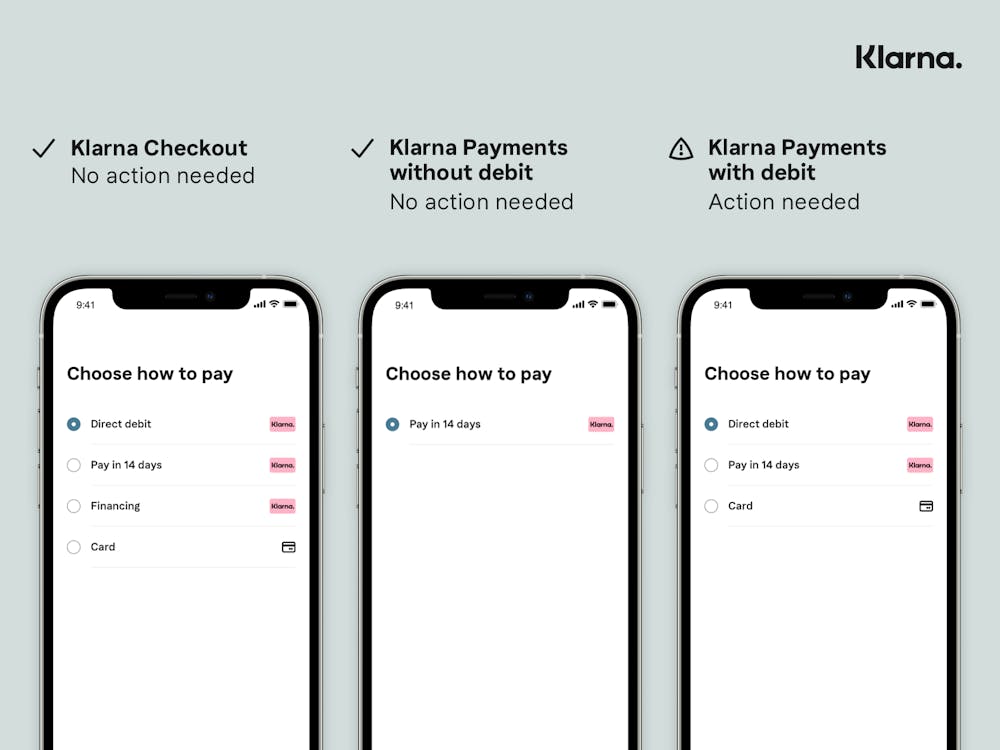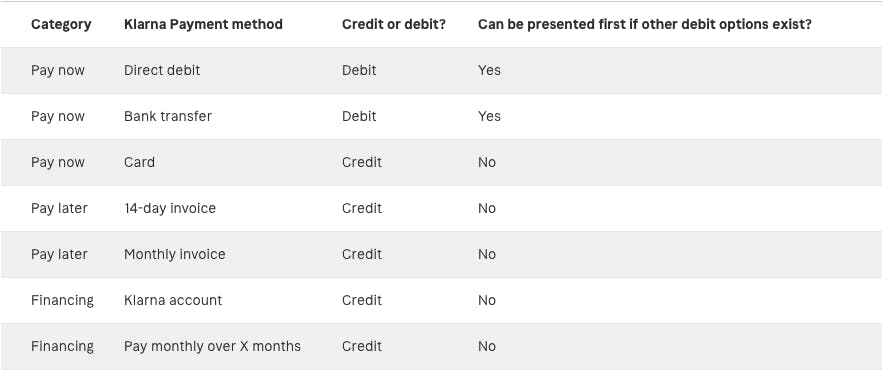Køb nu, betal senere med Klarna

Køb Drømmehåret Med Klarna
Hos Nythaar Extensions har vi fornøjelsen at tilbyde vores kunder, at de kan købe hair extensions idag og betale senere med Klarna.
Sådan betaler du med Klarna
Kunne du tænke dig at afgive en bestilling med Klarna som betalingsmetode? Så skal du bare handle hos os præcis som du plejer:
1. Find dine ønskede varer, og læg dem i kurven.
2. Forsæt til betalingssiden ved at klikke på 'Gå til kassen,' og udfyld dine informationer.
3. Når du kommer til betalingsvinduet skal du vælge 'Klarna' som betalingsløsning, og følge instruktionerne i Klarna-vinduet.
4. Når informationerne er godkendt, er dit køb gået igennem, og du vil snarest modtage en e-mail om din kontoinformationer hos Klarna.
Karna's Privacy Notice
When adding Klarna Payments to your site, you need to consider
- Data protection and data sharing aspects
- Required wording on order confirmation button to ensure legal obligation to pay
- T&C information
Please seek legal advice to ensure compliance with applicable regulations.
National and EU rules such as the GDPR sets certain limits to how and when you may share customer identifying information with Klarna.
If you share personal data with Klarna you need to explain this in your privacy notice and link to Klarna’s privacy notice there. Below is an example of what that could look like in your existing privacy notice (the specific data categories transferred to be added, and text to be translated into your local language):
“In order to offer you Klarna’s payment methods, we might in the checkout pass your personal data in the form of contact and order details to Klarna, in order for Klarna to assess whether you qualify for their payment methods and to tailor those payment methods for you. Your personal data transferred is processed in line with Klarna’s own privacy notice.”
A court ruling (case C-249-21) has established a principle regarding what copy needs to be displayed on the order confirmation button in retailers' checkout in order to legally obligate the consumer to pay. It is not enough to just state “order”; it needs to combine an order with the obligation to pay, similar to wording like “order and pay”. It is the responsibility of each individual online retailer who has integrated Klarna Payments to ensure compliance with the above-mentioned principle since the retailer controls the order confirmation button. More information can be found in KP Best Practices - payment widget.
Ensure that your terms and conditions reflect your cooperation with Klarna, and that you comply with applicable laws.
Så påverkas du av den nya kreditlagen
Sveriges riksdag har tidigare i år beslutat om en ny kreditlag. Den innebär i korthet att om det finns både ett kredit- och ett direktbetalningsalternativ i kassan så får inte kreditalternativet visas först eller redan vara ifyllt. Lagen träder i kraft den första juli 2020.
Här är vad du behöver veta om du har följande betalnings- och kassalternativ:

Klarna Checkout (KCO): Du behöver inte vidta några åtgärder.
Klarna kommer att hantera förändringen och se till att ett direktbetalningsalternativ visas först om ett sådant finns.
Klarna Payments (KP) utan något direktbetalningsalternativ. Du behöver inte vidta några åtgärder.
Du måste bara se till att ett direktbetalningsalternativ är det första alternativet om du erbjuder det som betalningsmetod.
Klarna Payment (KP) med ett direktbetalningsalternativ: Du måste vidta åtgärder.
Som e-handlare med Klarna Payment (KP) har du kontroll över ordningen på betalningsmetoderna som du har i din kassa och kommer därför att behöva vidta åtgärder för att följa den nya lagen.
Fortsätt läsa för mer information om hur KCO kommer att presenteras och vilka åtgärder vi rekommenderar för dig som har KP med direktbetalningsalternativ.
Vad den nya lagen innebär
Den nya kreditlagen som Sveriges riksdag har antagit (Regeringens proposition) kommer att träda i kraft den första juli 2020 och kommer endast att tillämpas i Sverige. Lagen ställer krav på hur olika betalningsmetoder presenteras i kassan, och den tvingar e-handlare att visa ett direktbetalningsalternativ före kreditalternativ, om båda alternativen finns tillgängliga i kassan.
Skyldigheterna i den nya lagen gäller alla parter som presenterar eller behandlar betalningsmetoder. Detta inkluderar: e-handlare, partners och betalningstjänstleverantörer (PSP) såsom banker. För att kunna navigera i ändringarna har vi skapat riktlinjer för att hjälpa våra e-handlare och partners att anpassa sig så att de nya lagliga kraven uppfylls.
Vad innebär det här för mig som handlare?
Exakt hur du påverkas beror på vilka betalningsmetoder som du erbjuder och vilken kassalösning som du har valt. Den nya lagen kräver inte att en handlare måste erbjuda ett direktbetalningsalternativ, utan styr hur betalningsalternativen presenteras i kassan.
Nedan finns en översikt över Klarna betalningsmetoder, och hur de kategoriseras i termer av kredit- eller direktbetalningsalternativ.

Vad behöver jag förbereda?
Handlare med Klarna Checkout (KCO v2 & v3)
Ingen åtgärd behövs. Klarna kommer att uppdatera den nuvarande KCO-lösningen för den svenska marknaden och säkerställa att de nya lagkraven följs. Ni kommer att märka att direktbetalningsalternativ, såsom Direktbetalning (när tillgängligt), kommer att presenteras som det första betalningsalternativet i din kassa.
Handlare med Klarna Payments (KP)
Om ni erbjuder Klarna Payments i er kassa så kan inte Klarna kontrollera i vilken ordning betalningsalterntiven presenteras. Det innebär att det är den enskilda handlaren som är ensam ansvarig för att se till att er kassa är kompatibel och följer den nya lagstiftningen innan den träder i kraft (1 juli 2020).
Om ni har Klarna Payments (KP) och flertalet betalningsmetoder via Klarna inom samma modul så kommer Klarna att sortera dessa. Om det finns ett direktbetalningsalternativ så kommer det att presenteras först. Kreditalternativ som inkluderar ränta kommer alltid att att presenteras sist om det finns andra val tillgängliga. Om flera betalningssätt med Klarna är placerade i olika moduler kan Klarna ej kontrollera i vilken ordning de presenteras.
Klarna kommer att sluta stödja Klarna betalningsmetoder (KPM) från och med september 2020. Åtgärd rekommenderas.
Klarna kommer inte längre att stödja KPM från och med september 2020. För att få automatiska uppdateringar (inklusive juridisk efterlevnad) rekommenderar vi att alla handlare migrerar till Klarna Checkout (KCO) eller Klarna Payments (KP). Med KCO kommer Klarna att hantera sorteringen av betalningsmetoder åt dig. För att migrera till KCO kan du använda självbetjäningsflödet som finns tillgängligt i portalen för handlare (länk). Prata gärna med din kontakt på Klarna för att få mer information om priser och hur du flyttar över till Klarna Checkout eller Klarna Payments.
New credit legislation - How you will be impacted
New legislation has been adopted by the Swedish Parliament stating that if both credit and debit payment options are offered by a merchant, the debit option(s) must be presented before the credit option(s) in the checkout. This law takes effect 1 July 2020.
Here’s what you need to know if you have the following payment & checkout options:

Klarna Checkout (KCO): No action required.
Klarna will take care of all the logic to ensure debit payment options are shown first.
Klarna Payments (KP) with no debit options: No action required.
You are only required to make sure a debit option is placed as the first option if you offer it as a payment method.
Klarna Payment (KP) with debit options: Action required.
As a merchant, you are in control of the order in which payment methods are organized inside your checkout and will need to take steps to comply with the new law.
Continue reading for more details on how KCO will be presented, and what actions we recommend if you have KP with debit options.
What the new law means
New legislation (Regeringens proposition) adopted by the Swedish Parliament will take effect on 1 July 2020, and will only be applicable to Sweden. The law sets requirements on the presentation of payment methods in online checkouts, enforcing debit payment options to be displayed before any credit payment options, if both are available.
Obligations in the new regulation apply to any parties who present or process payment methods. This includes: merchants, partners, and Payment Service Providers (PSP) like banks. To navigate the new changes, we’ve published guidelines, to help our merchants and partners to ensure compliance with the legal requirements.
What does this mean for me as a merchant?
The impact for you as a merchant will depend on what payment methods you offer and what checkout solution you use. The new legislation does not require merchants to provide debit payment methods, but does regulate how to present them in an online checkout if you do.
Below is an overview of Klarna payment methods, and how each categorizes in terms of credit or debit options.

What do I need to do to be prepared?
Merchants with Klarna Checkout (KCO v2 & v3)
No action needed. Klarna will update the current KCO solution for the Swedish market to make sure that the new legal requirements are followed. You will notice that debit payment methods such as Direct Debit, (when available), will be presented as the first option in your checkout.
Merchants with Klarna Payments (KP)
If you offer Klarna Payments in your checkout, Klarna cannot control the order or logic in which the payment methods are presented. Therefore, as a merchant you are solely responsible to ensure your checkout is compliant and lawful according to the new legislation before it enters into force (1 July 2020).
If you have Klarna Payments (KP) and multiple Klarna payment methods within the same widget then we will manage the logic of sorting these. If a debit payment option exists then that will be displayed first. Credit payment methods that include interest rate will always be displayed as the last option if others exist. If the multiple Klarna payment methods are placed in different widgets then we cannot control in what order they will be sorted.
Klarna will discontinue support of Klarna Payment Methods (KPM) as of September 2020. Action recommended.
Klarna will no longer be supporting KPM as of September 2020. For automatic updates (including legal compliance), we recommend all merchants move to Klarna Checkout (KCO) or Klarna Payments (KP). With KCO, Klarna will handle the sorting of payment methods for you. To migrate to KCO, you can use the self service flow that is available in the merchants portal (link). Please reach out to your Klarna account manager to get more information about pricing and how to transfer to Klarna Checkout or Klarna Payments.
